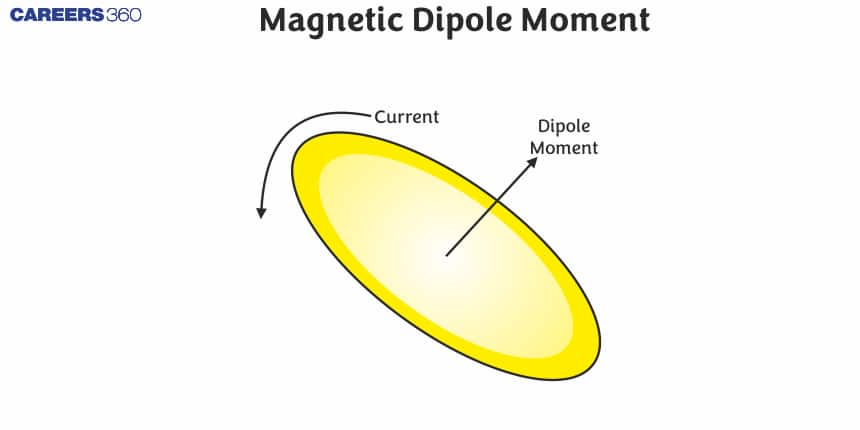Magnetic Dipole Moment - Definition, Formula, FAQs
A magnetic dipole is similar to a very small magnet with two poles; the North and South poles that form a magnetic field. It helps us to get knowledge about magnets, current loops, and moving charges for magnetic force and effects. Magnetic dipole strength is characterized by a magnetic dipole moment. A number of magnetic phenomena can be described by studying the concept of magnetic dipoles. Let's understand this concept in detail.
JEE Main/NEET 2027: Physics Important Formulas for Class 10
NEET 2025: Mock Test Series | Syllabus | High Scoring Topics | PYQs
JEE Main: Study Materials | High Scoring Topics | Preparation Guide
JEE Main: Syllabus | Sample Papers | Mock Tests | PYQs
- What is Magnetic Dipole?
- What is Magnetic Dipole Moment?
- Derivation of Magnetic Dipole Moment

What is Magnetic Dipole?
A system that generates a magnetic field and has two poles (North and South) is referred as a Magnetic dipole. It is a fundamental concept in Physics that describes the behavior of magnetic materials and the field generated by moving charges or current loops.
What is Magnetic Dipole Moment?
A magnetic dipole is defined as a pair of equal and opposite magnetic charges or, it can be understood, as a bar magnet that produces a magnetic field. The strength of a magnetic dipole is measured by its magnetic dipole moment. It is represented by $\mu$.
The SI unit of magnetic dipole moment is ampere-square meter $\left(A \cdot \mathrm{~m}^2\right)$.
Formula to Calculate Magnetic Dipole Moment
$$
\mu=I \cdot A
$$
where:
$I$ is the current in the loop (in amperes)
$A$ is the area of the loop (in square meters)
NCERT Physics Notes:
- NCERT Notes For All Subjects
- NCERT Solutions for All Subjects
- NCERT Exemplar Solutions for All Subjects
Derivation of Magnetic Dipole Moment
Torque on a Current carrying Loop: A current-carrying loop in a uniform magnetic field ( $B$ ) experiences torque:
$$
\tau=I \cdot A \cdot B \cdot \sin \theta
$$
where:
$I=$ current,
$A=$ area of the loop,
$\theta=$ angle between the magnetic field and the normal to the loop.
Vector Form of Torque: The torque can also be expressed as:
$$
\vec{\tau}=\vec{\mu} \times \vec{B}
$$
Comparing the two, the magnetic dipole moment is:
$$
\mu=I \cdot A
$$
Special Cases:
Circular Loop: $\mu=I \cdot \pi r^2$,
Multiple Loops: $\mu=N \cdot I \cdot A$, where $N=$ number of turns.
Thus, the magnetic dipole moment quantifies the loop’s ability to produce a magnetic field.
Magnetic Field Due to Dipole
The magnetic field produced by a dipole decreases with distance and has a specific pattern. Mathematically, it is represented as:
$$
B=\frac{\mu_0}{4 \pi} \cdot \frac{2 \mu \cos \theta}{r^3}
$$
in the axial direction, and:
$$
B=\frac{\mu_0}{4 \pi} \cdot \frac{\mu \sin \theta}{r^3}
$$
in the equatorial direction.
Here:
$\mu_0$ is the permeability of free space
$\mu$ is the magnetic dipole moment
$\theta$ is the angle between the dipole axis and the point of observation
$r$ is the distance from the dipole
| Related Topics |
Magnetic Dipole in a Uniform Magnetic Field
Magnetic field when placed in a uniform magnetic field can be expressed as:
1. Torque ( $\tau$ ): A torque aligns the dipole with the magnetic field direction, given by:
$$
\tau=\mu \times B
$$
or $\tau=\mu B \sin \theta$, where $\theta$ is the angle between $\mu$ and $B$.
2. Potential Energy $(U)$ : The potential energy of the dipole in the field is:
$$
U=-\mu \cdot B
$$
or $U=-\mu B \cos \theta$.
Frequently Asked Questions (FAQs)
The number of magnetic field lines passing through a surface, held perpendicular to the lines, is called the magnetic flux through the surface. SI unit is 1 Wb = 1N.m/A.
The pole strength (m) of a magnetic dipole is given by its magnetic dipole moment divided by its magnetic length.
m= M/2l
Dimensions: [m] = [LI]
SI unit: the ampere.metre (A.m)
The pole strength (m) of a magnetic dipole is given by its magnetic dipole moment divided by its magnetic length.
m= M/2l
Dimensions: [m] = [LI]
SI unit: the ampere.metre (A.m)
Circular current loop as magnetic dipole behaves sort of like a magnet. Its magnetic flux lines also as north and south poles, a bit like a magnet. To place all this during a simpler perspective, imagine a clock. Now the clock completes one round from 12 - 12. That direction is what we call clockwise. So if the current is clockwise then the direction of magnetic flux lines is going to be inward direction.
Similarly, direction opposite to movement of clock is named anti-clockwise direction. So if current is occupation anti-clockwise direction the direction of magnetic flux lines are going to be in outward direction i.e. If current is in an anti-clockwise direction then the direction of magnetic flux lines is going to be in an outward direction. If current is in clockwise direction the direction of magnetic flux lines is going to be inward direction. And this is the answer to the question that explains the behavior of a current loop as a magnetic dipole..
They both are an equivalent. The strength of a dipole, called the dipole moment, could also be thought of as a measure of a dipole's ability to show itself into alignment with a given external magnetic flux . The term "magnetic moment" is a smaller amount used. A dipole arises via current loops.
The magnetic dipole moment of a magnet is the magnitude of the torque that acts on it when it is placed with its axis at right-angles to a uniform magnetic field of unit induction.
SI unit of magnetic dipole moment is NmT-1.
Also Read
26 Nov'24 02:00 AM
25 Nov'24 03:57 PM
25 Nov'24 01:16 PM
25 Nov'24 12:38 PM
24 Nov'24 03:53 PM
12 Nov'24 11:17 PM